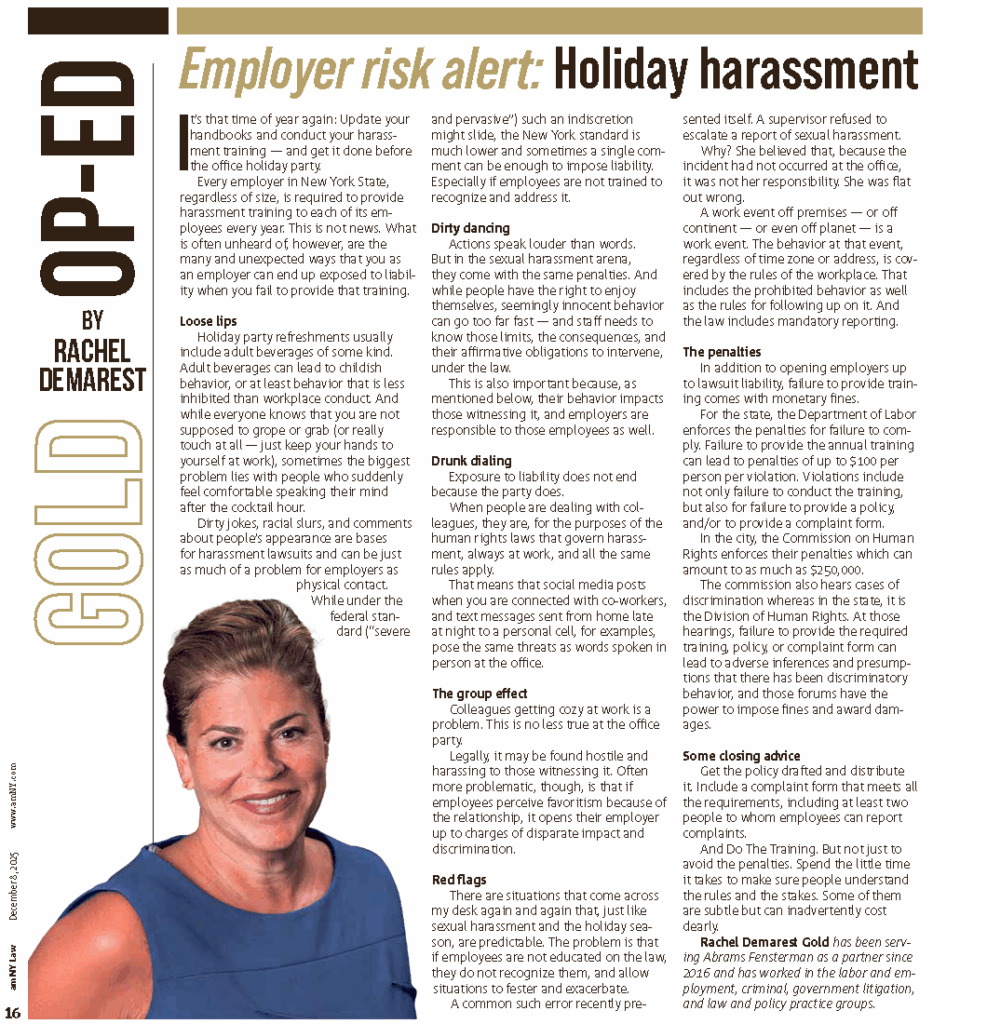Newsday
By Jamie Herzlich
[email protected] Updated July 23, 2020 6:00 AM
As employees return to the office after the coronavirus shutdown, navigating new workplace norms can be tricky and costly for employers making assumptions about their staff’s needs.
For instance, employers may think they’re helping older or pregnant workers by preemptively telling them to work from home, but that can be a form of discrimination, according to updated guidance on workplace discrimination from the Equal Employment Opportunity Commission.
The guidance also addresses pandemic-related harassment, and reasonable accommodations in the workplace.
“The guidance not only reiterates the law, but is reminding everyone of what they should be doing anyhow,” says Barbara DeMatteo, director of HR consulting at Jericho-based Portnoy, Messinger, Pearl & Associates, Inc.
It helps considering “more and more COVID-related workplace issues are coming up daily that employers really never had to deal with before,” she says.
For instance, deciding who should return to the office.
Even though those 65 and older are at a higher risk for complications of COVID-19 if they get the virus, the Age Discrimination in Employment Act (ADEA) prohibits employment discrimination against individuals age 40 and older.
The ADEA would prohibit such discrimination “even if the employer acted for benevolent reasons such as protecting the employee due to higher risk of severe illness from COVID-19,” the guidance says. For guidance see: https://nwsdy.li/ADEA.
However, employers can provide flexibility to these workers, DeMatteo says.
But you can’t automatically assume they want to stay home, she says. The same goes for pregnant workers or those with underlying health conditions.
But issues continue to arise.
“We’re getting a lot of questions from employers about whether they should tell their older workers to continue to work from home,” says David Mahoney, a partner and labor law group member at SilvermanAcampora in Jericho.
He says the guidance helps provide clarity.
It also addresses whether an employer must provide a reasonable accommodation for an employee who fears they may expose an at-risk family member to COVID-19, he added.
“The EEOC explains that employers aren’t required to allow employees to work from home just to avoid exposing a family member to COVID,” Mahoney says.
In addition, the guidance says employers can make information available in advance to all employees about who to contact — if they wish — to request accommodation for a disability that they may need upon return to the workplace, even if no date has been announced for their return, Mahoney says.
This isn’t mandatory but could be a best practice for planning purposes.
But some employers may see it as opening a Pandora’s box, experts say.
“I don’t know an employer who is embracing that approach upon reopening,” says Rachel Demarest Gold, an employment law partner at Abrams Fensterman LLP in Lake Success.
If employers extend an open-ended offer to accommodate employees, they must treat requests equally and fairly to avoid any potential legal issues. she says.
Keep in mind employers don’t have to preemptively offer a reasonable accommodation, Demarest Gold says. An employee has to first request it.
The employer, once asked for an accommodation, must engage in an “interactive dialogue” with the employee about their needs, and agencies are now encouraging cooperation more than ever because of the surge in issues, questions and complaints, Demarest Gold says.
Consider when it comes to reasonable accommodations the request must be “reasonable and must not cause an undue hardship to the business,” says Seth Kaufman, a partner in Fisher Phillips’ New York City office.
That undue hardship has to rise to the level of causing “a significant difficulty or expense,” he says.
Still, he encourages employers to be flexible where possible.
“The pandemic shifted mindsets” and created accommodations that employers may not have previously considered as reasonable or granted on such a large scale, like working from home, says Kaufman, noting, “it’s much harder now to say allowing an employee to work from home isn’t reasonable.“
Outside of reasonable accommodations, the guidance also addresses workplace discrimination.
The guidance says “managers should be alert to demeaning, derogatory, or hostile remarks directed to employees who are or are perceived to be of Chinese or other Asian national origin, including about the coronavirus or its origins.”
Given that, it’s important employers conduct annual anti-harassment/discrimination training and reiterate there’s a no tolerance policy against discrimination of any kind, DeMatteo says.
Sign up to get COVID-19 text alerts.
Associated Url: Updated EEOC Guidance ‘Reminding Everyone Of What They Should Be Doing Anyhow,’ Expert Says – Newsday – Rachel Demarest Gold quoted





